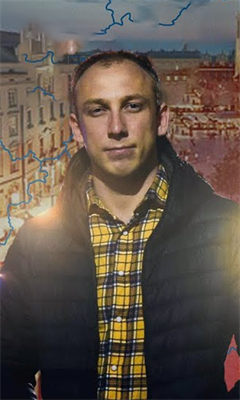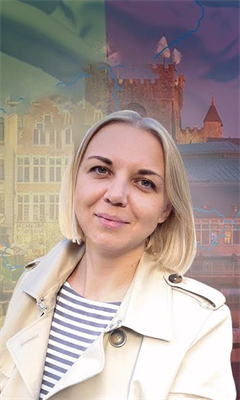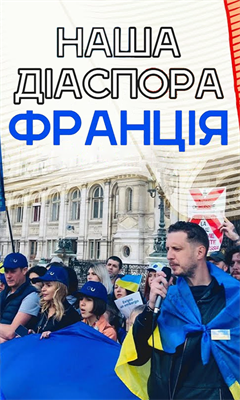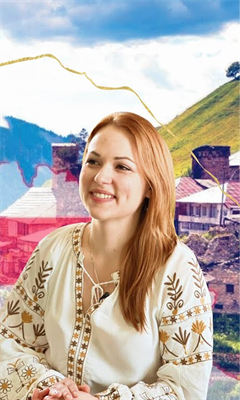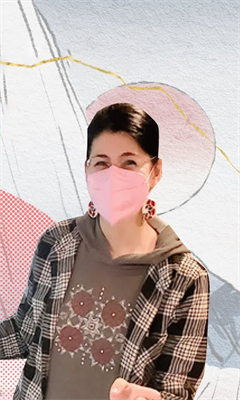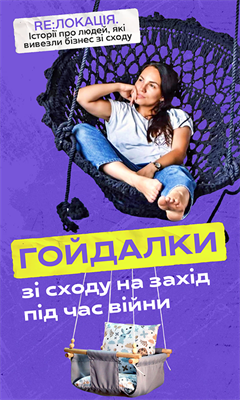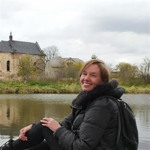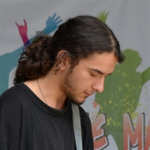I’ve survived under the rubble of the Mariupol Drama Theater. People were begging for help
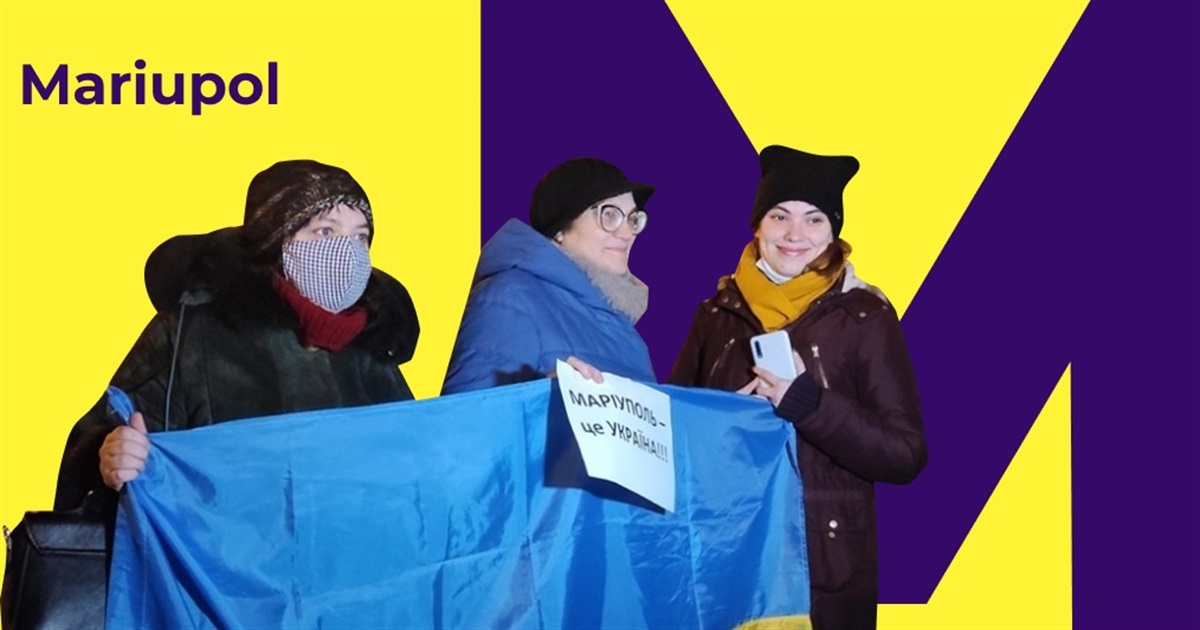
Halyna’s family managed to evacuate the other day. Even so, they haven’t recovered from the horrors endured yet. Halyna told Svoi media what had been happening within the walls of the Drama Theater and how she and her family had survived in the besieged Mariupol.
The shelling was so heavy we couldn’t even fetch some water from the kitchen
The city district we lived in was shelled with a whole range of weaponry. I’ve learned to differentiate between the work of the Grad and the howitzer, how it feels when the mines of various calibers fall, and the aerial bomb explodes, all by ear. I can also tell by ear whether the aircraft carries four heavy bombs or eight lighter ones.
Our house suffered two direct hits. After the first hit, all the windows, the interior, and entry doors in our flat were blown out with the frames. The iron front door to our block was also ripped off by the explosive wave. The second shell actually brought down the ceiling in the apartment. At that moment, we were in one of the rooms, where we had placed old wooden chests of drawers all around and covered them with blankets.
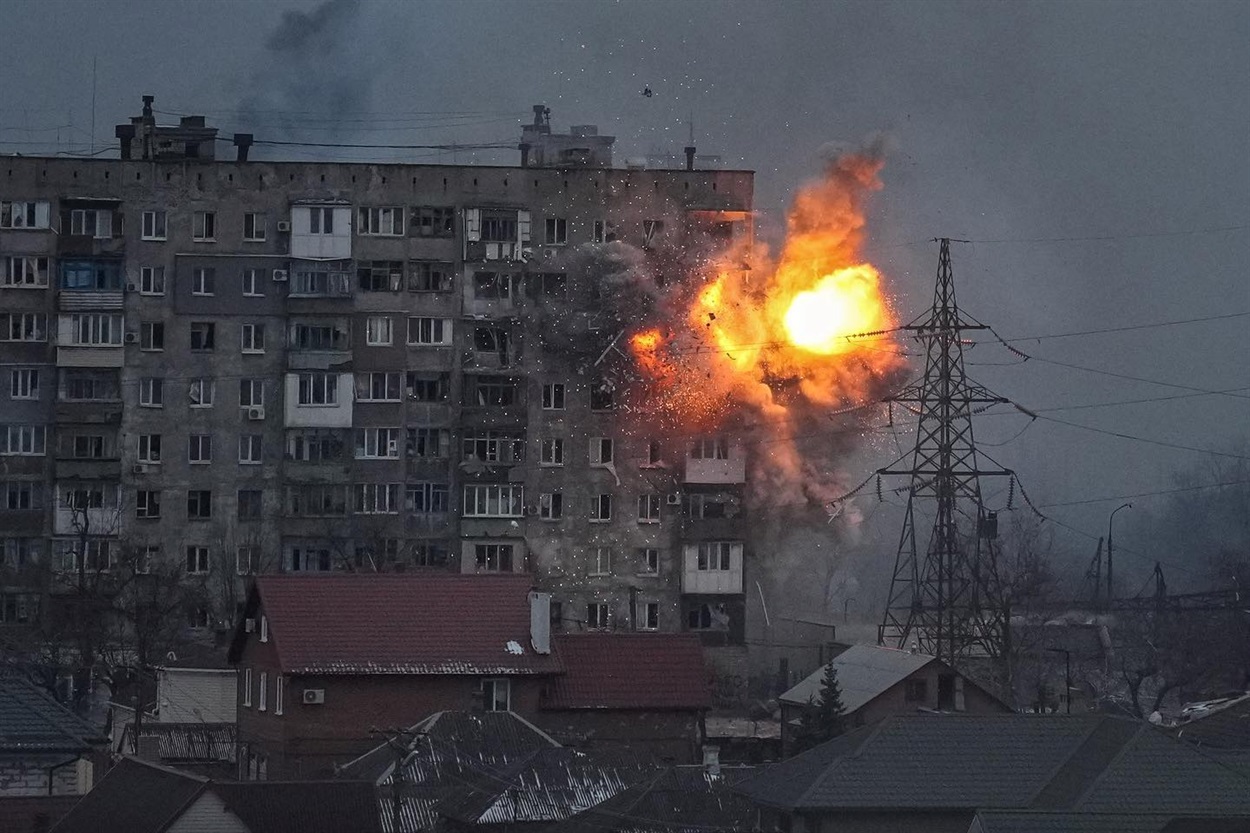 Mariupol under the shelling
Mariupol under the shelling
We’ve managed to get out of the piles of glass and stone. One neighbor was killed, and another was injured.
We couldn’t hide in our apartment anymore. That’s why we went to live in our neighbors’ hall. We spent six days there. The shelling was so heavy we couldn’t even fetch some water from the kitchen. We had one bottle of water and some cookies, given by the territorial defense fighters. The house shuddered with every shot. One day we managed to get to the window. We saw that the house across the street had caught fire. This fire was engulfing it so quickly that we realized we couldn’t stay there any longer. Therefore, the neighbors and we decided to go to the bomb shelter in the Drama Theater
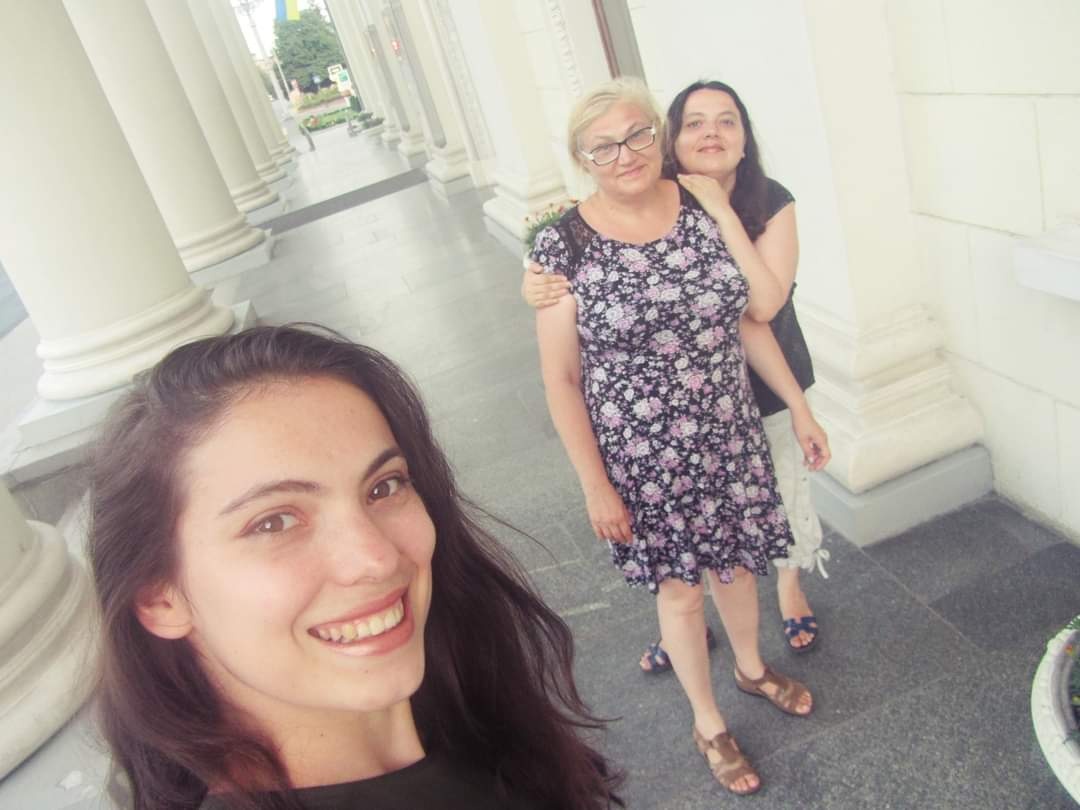 Halyna and her daughters in Mariupol before the war
Halyna and her daughters in Mariupol before the war
The tank turned around and opened fire on us
I had heard many times from my acquaintances and neighbors that there would be some buses near the Drama Theater to evacuate the civilians. But there were none. People packed their things and left on their own, in their cars.
The six of us headed for the Drama Theater: myself, my two daughters, and our three neighbors. We went on foot.
Near the “1,000 Little Things” [Ukrainian: 1000 Dribnyts] shop a Ukrainian soldier ran up to us and asked where those “liberators” were. I told him all I knew in detail - and we moved on. However, we didn’t notice at first that the tanks which stood near our house started moving across the avenue. I’m sure the Russians realized that we’d told our military about them.
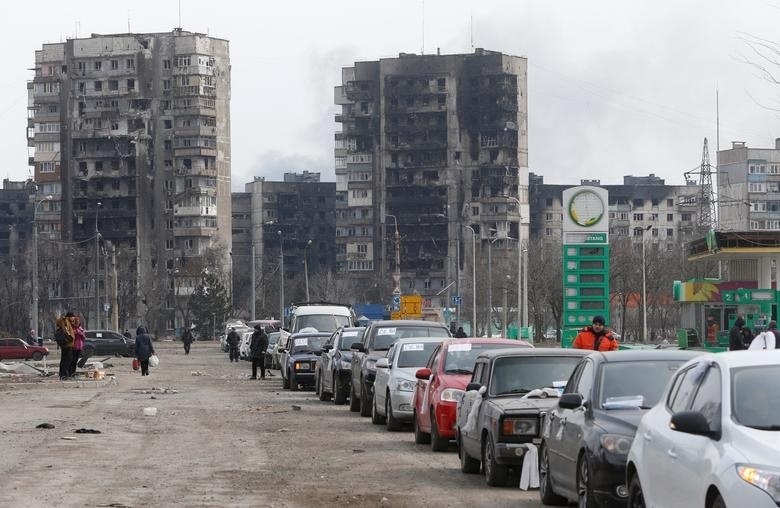 Фото: Reuters
Фото: Reuters
When we ran out into the open near the children’s health center on Myru avenue, the tank turned around and opened fire on us. We ran to the previously destroyed hospital as fast as we could. We found perhaps the only undamaged small consulting room, and all six of us hid in it. We heard that the tank was still waiting for us. Thus, we also waited and set off at a run again, but not along the avenue. We went down to the Italian street, and from there, in the end, we got to the drama theater. We brought all our water, food, and blankets along.
We survived under the rubble
When we reached the site, we realized that it was terribly quiet down there compared to our block. The theater was warm. As soon as we arrived, we were offered a cup of tea. We were told that we would receive hot meals at midday as there was a field kitchen there.
The other day, some people left the drama theater in 160 private cars. So, there was ample room for the newcomers.
We found a place to settle on the stairs on the third floor. We were immediately told that this wasn’t the best accommodation option because there was only one wall and a window which had been blown out by the explosive wave the other day. It was sealed with oilcloth. However, after six days of living in a cold, narrow hall, we were glad to be in a warm place and have a chance to stretch our legs out.
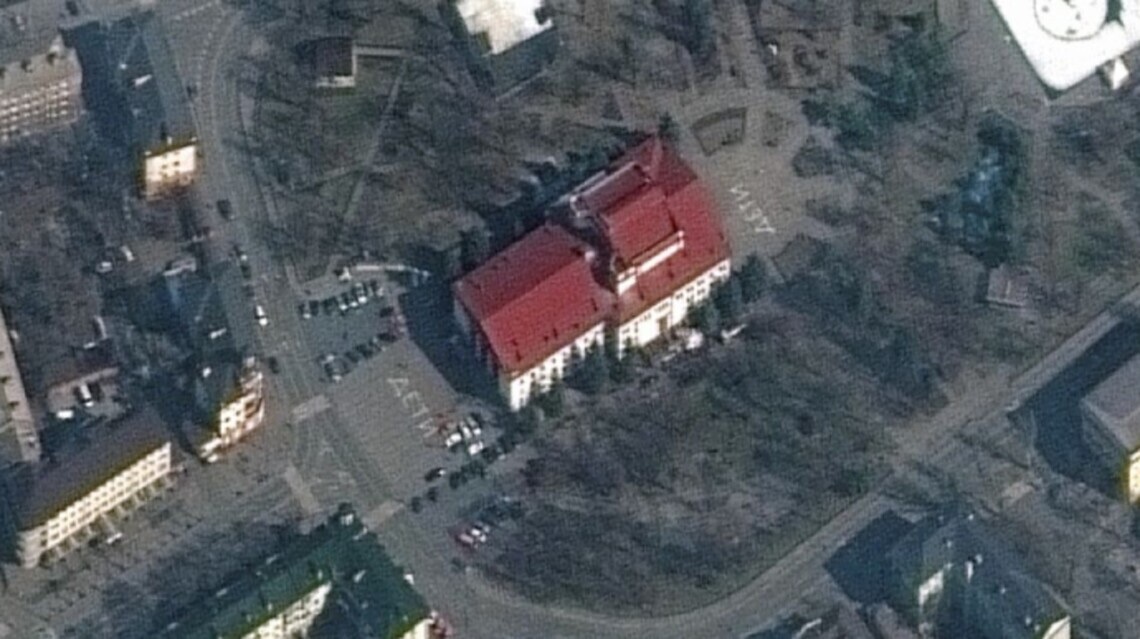
Then a volunteer came up to me - that's what we called the people who had been in the shelter for a long time and helped the newcomers. He said we would be given blankets and pillows. Then he took me to the first-aid post near the back door. At that time, I didn’t realize (we found it out later on) that it was the most dangerous place. My daughter Halyna and the neighbors’ daughter Karyna were on the stairs; Karyna’s mother was outside under the colonnade; her father was in the lobby on the first floor. My daughter Masha went to visit the uncle, who lived near the theater.
An hour and a half had passed since our arrival at the drama theater. I was standing by the doors of the first-aid post, and suddenly I felt something. Later I was told that at first the aerial bomb dropped by a Russian aircraft on the theater began to break through the roof. The explosion occurred only when it fell. Apparently, I felt that first shock instinctively.
In the early days of the war, when there still was mobile signal and Internet, I watched a video about how to behave during an air raid. I remembered immediately that one had to jump into the doorway - and that’s what I did. The door of the first-aid post was ripped off in just a second after that, and the bricks started falling. At that post, there had been a nurse and the old woman and man who had been given an injection.
Before I realized what happened, the boys, volunteers, had turned on their flashlights and started giving commands. They said that all the survivors had to hold each other by the shoulders and not try to get anyone out without their help because there was a threat of the building’s collapse; the uninjured were to go out first. The boys quickly removed the bricks and pulled me out. At that moment, it seemed to me that I wasn’t injured, but then I saw blood. I didn’t feel any pain at all, so we jumped up and started getting out slowly.
All the exits we managed to get to were blocked. The volunteers asked, “Who knows the drama theater layout? We need to find the main entrance to the basement.”
My mother used to work in the theater, and I recollected where the entrance to the basement under the stage was. That’s how we found the way. There is a back door on the side of the Drama Theater, but it was also blocked up. Having removed the rocks quickly, the boys saw what was happening outside. The fighting hadn’t been over yet, so we couldn’t leave. Therefore, we continued to make our way to the main basement, which was not blocked up.
I couldn’t sit back because there was my daughter and our neighbors’ child on the third floor. As I was getting there, I heard someone call me. Those were my neighbors. Halia and Karyna followed them making their way to me. The girls abandoned our things but saved our cat and the neighbors’ hamster. They were all white, covered in plaster, but, most importantly, they were alive. Karyna’s mother, who had been standing near the colonnade, was thrown onto the lobby’s floor. Fortunately, a few minutes before the tragedy, some woman had swept up the broken glass in that place. So, our neighbor didn’t suffer any significant injuries, only minor cuts.
Having made it to the main basement, a volunteer Zhenia turned on a flashlight and went to save people from the rubble. Although we were asked not to go outside, people still ran out in panic trying to find their relatives and friends. We couldn’t just sit back either because we were terribly worried about our daughter Masha. She was outdoors during the raid, and I didn’t know where exactly she was. We were shouting at the top of our voices, “Masha!” And then we saw her standing near the theater. When she saw that the part of the drama theater had collapsed, she thought that we were no more as well... Nevertheless, she was running about and looking for us; she didn’t give up hope. Masha went inside and climbed the stairs up to the place where we used to settle. Meanwhile, the shelling continued; not for a moment did it stop.
The boys returned to the drama theater three times to dig the civilians up
When we were fleeing the drama theater and passing the office of the Security Services of Ukraine, the people, staying there, approached us. We told them about the air raid and the destroyed theater and that there were still some civilians there. More than ten people headed toward the theater. I know that they were fired upon and not given a chance to work.
When all six of us reunited, the question arose: where to go next? We decided to go to the philharmonic since there was also a shelter there. About 60 other survivors joined us. The other part of the people ran to the railway station. I can’t say how many people died in the theater. However, I’m sure there were many deaths. Hundreds of civilians
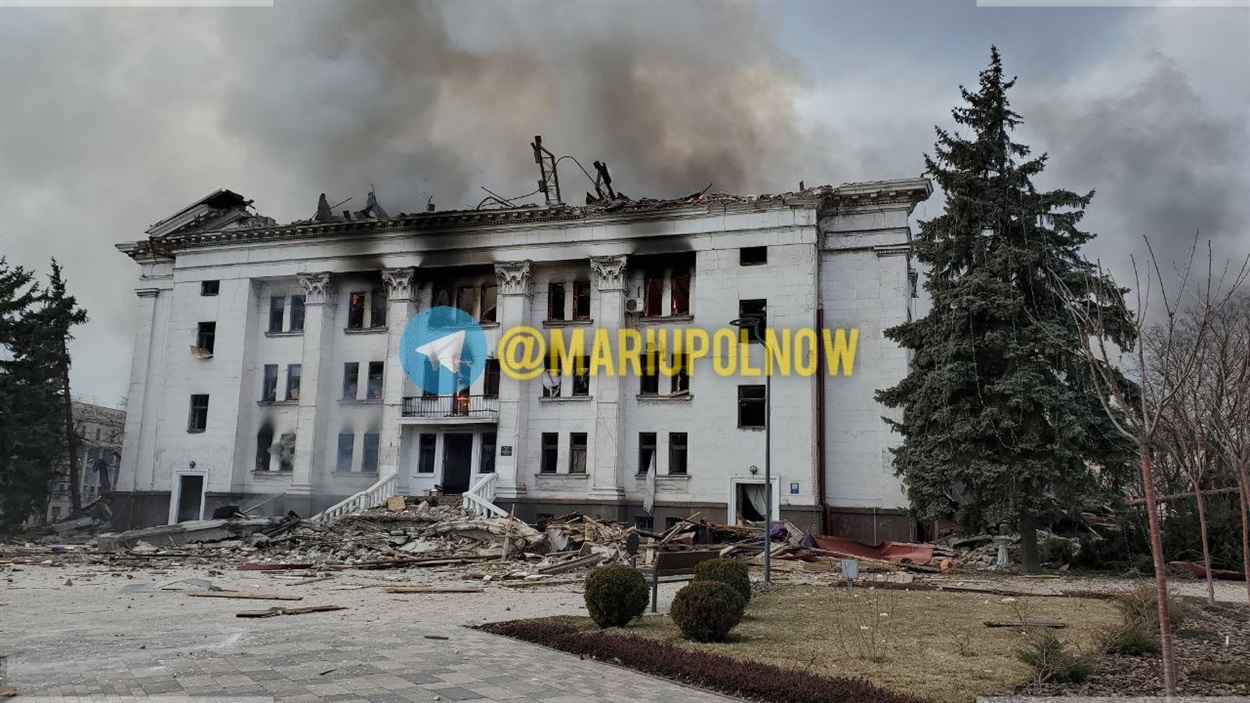
We got to our new location pretty soon. The woman janitor caringly made some tea for everyone who came from the drama theater. Also, I met the guys who had saved my life by pulling me out from under the rubble. One of them said he was shell-shocked; the other one recognized me.
It was these guys who returned to the drama theater three times to dig the civilians up. I know that they sent ten injured people to the hospital. The next day, a part of the theater had already burned down, but these guys went to save people again. However, there were neither Mariupol residents nor bodies. Either the people had made their way out themselves or someone had helped them.
Thirty people could be crammed into a car meant for ten
The building of the philharmonic, which had become our next shelter, was also shelled. It seemed to us that the Russians were determined to fire on all the places where people were hiding.
The janitor had a small supply of petrol. We quickly found a car, chipped in, and decided to go to the checkpoint in the Moryakiv village. More than a hundred people were driven there by the janitor herself. Thirty people could be crammed into a car meant for ten. Several runs were made.
Then we walked 15 kilometers from the checkpoint to Melekino where we settled in our friends’ cottage. In four days, we found a man who drove us to Yalta for 500 hryvnias. On March 22, we were taken to Berdyansk for a thousand hryvnias per person. We lived in a sports complex for three days and were expecting to be evacuated. Since no buses arrived, we started walking. Then we saw some buses, and, eventually, we made it to Zaporizhzhia.
Now we are going to the west of Ukraine. Anyhow, I believe that I will definitely return to the Ukrainian Mariupol. In the meantime, my dream is for all the Russians to be thrown out of our land. May they go back to their precious Russia! As for us, we will definitely rebuild our cities and live in a free country!




